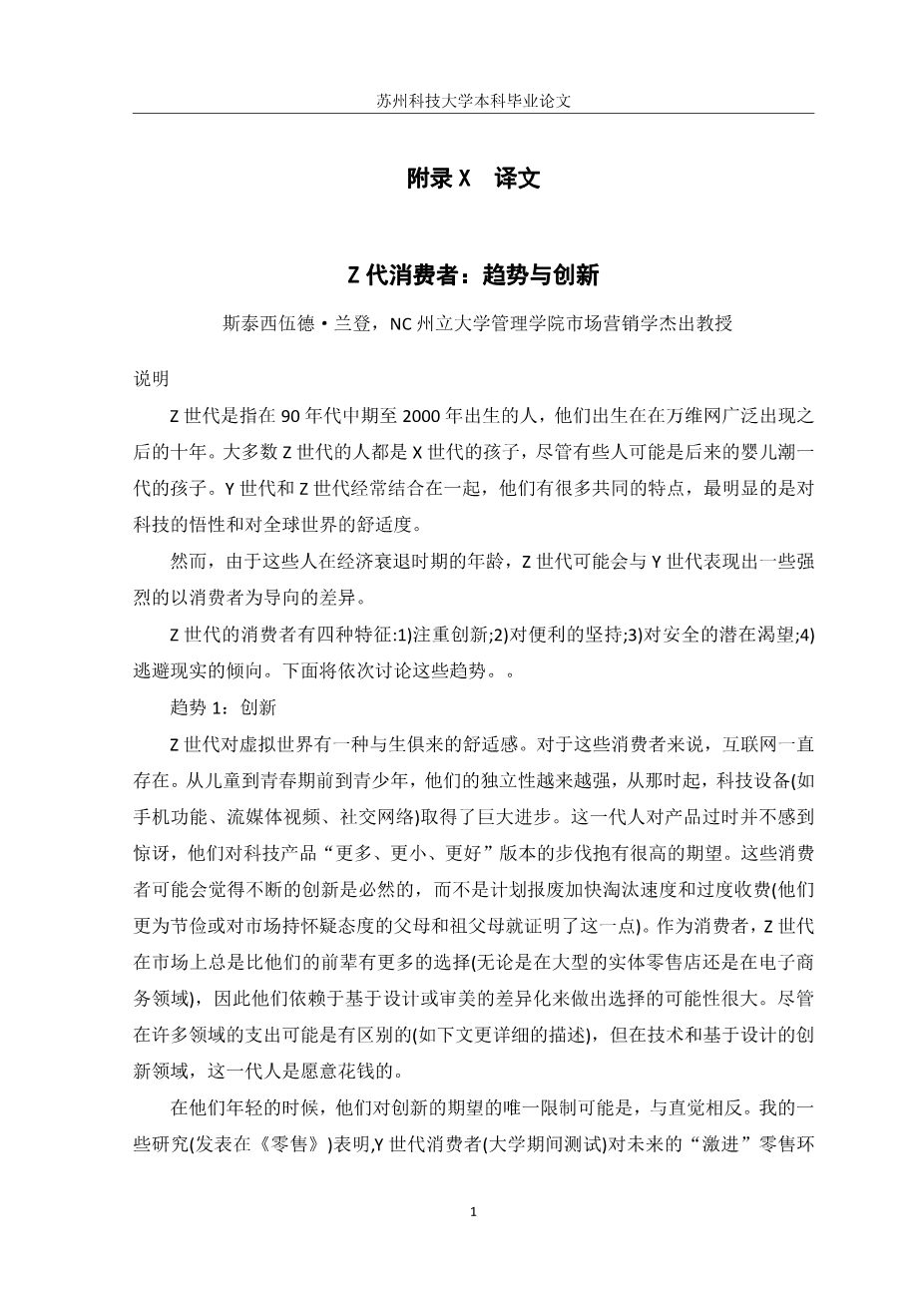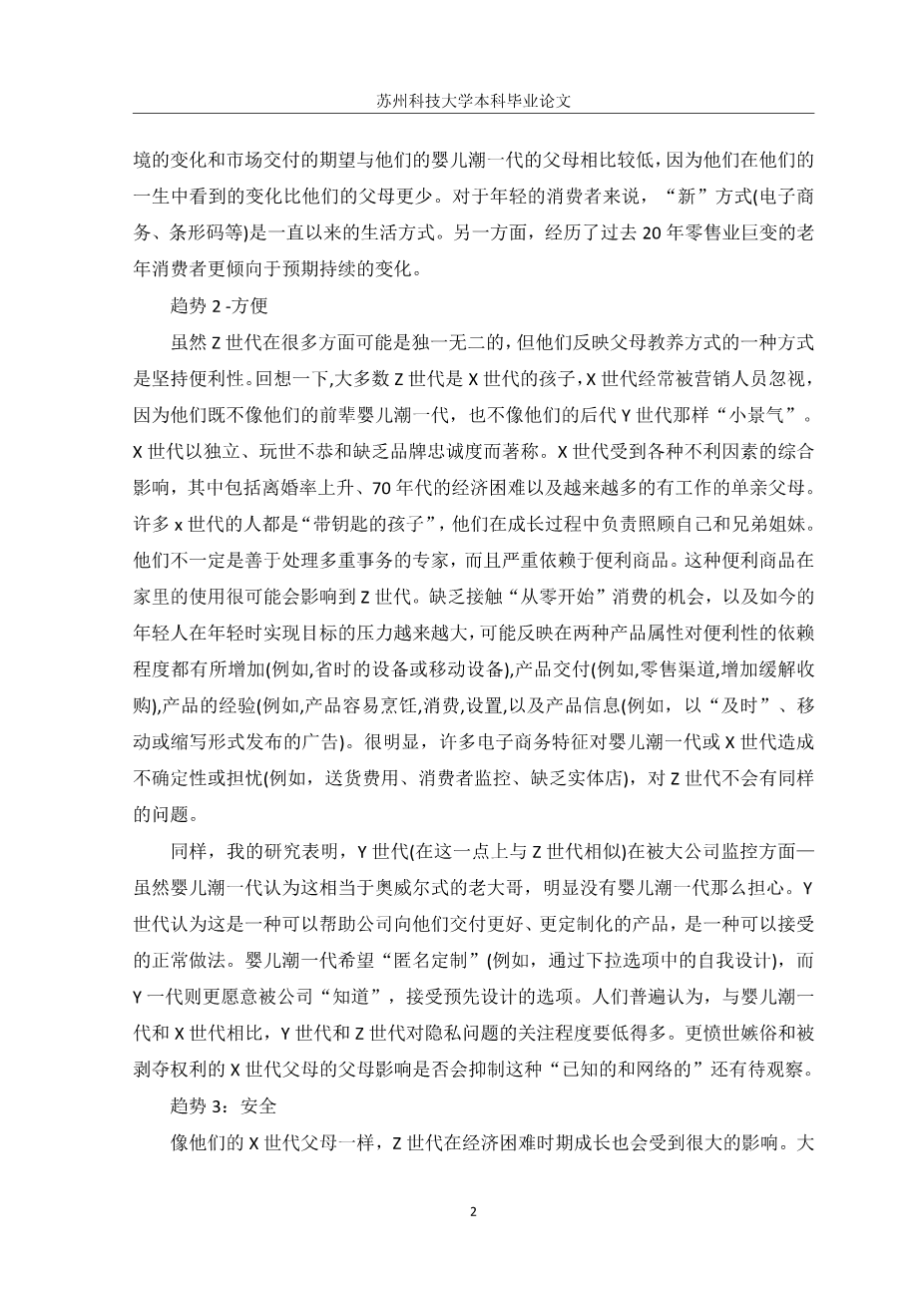Generation Z as Consumers: Trends and Innovation
Stacy Wood
Langdon Distinguished Professor of Marketing, College of Management, N.C. State University
Introduction
Generation Z refers to those individuals who were born in the decade following the widespread emergence of the World Wide Web, from the mid-1990rsquo;s to the early 2000rsquo;s. Most of Generation Z comprises the children of Gen X, although some may be children of later Baby Boomers. Generation Y and Generation Z are often combined and share many characteristics, most notably a savvy with technology and a comfort-level with the global world.
However, Generation Z will likely show some strong consumer-oriented differences from Generation Y because of the age of these individuals during periods of economic recession.
Four trends are likely to characterize Generation Z as consumers: 1) A focus on innovation, 2) An insistence on convenience, 3) An underlying desire for security, and 4) A tendency toward escapism. Each of these trends are discussed in turn below.
Trend #1- Innovation
Generation Z has an innate comfort with the virtual world. For these consumers, the Internet has always existed. Since the time of their growing independence from children to pre-teens to teenagers, great strides have been made in technological devices (e.g., cellphone capabilities, streaming video, social networks). This generation is not surprised by product obsolescence and has a high expectation for the pace of “more, smaller, and better” versions of technological products. Rather than feel outpaced and over-charged by planned obsolescence (as evidenced by their more frugal or market-cynical parents and grandparents), these consumers are likely to feel that constant innovation is a given. As consumers, Generation Z has always had more choices in the marketplace (both in big-box brick-and-mortar retailers and in e-commerce) than their predecessors and so their reliance on using design-based or aesthetic differentiation to make choices is likely to be strong. While spending may be discriminating in many areas (as described in greater detail below), being current in technological and design-based innovation is one area where this generation is willing to spend its money.
The only limit to their expectation for innovation may be, counter-intuitively, in their youth. Some of my research (published in the Journal of Retailing) demonstrates that Generation Y consumers (tested during their college years) had lower expectations for future “radical” changes in retail environments and marketplace delivery than their Baby Boomer parents because they had seen less change in their lifetime than had their parents. For younger consumers, the “new” way (e-commerce, bar-codes, etc.) was the way it had always been. On the other hand, older consumers who had seen the seismic shifts in retail over the past two decades were more prone to expect continuing changes.
Trend #2- Convenience
While Generation Z is likely to be unique in many ways, one way that they will reflect their parental upbringing is in the insistence on convenience. Recall that most of Generation Z are the children of Generation X. Generation X has often been an over-looked age cohort by marketers because they do not have the size of either their Baby Boomer predecessors or the following “boomlet,” Generation Y. Generation X is known for their independence, cynicism, and lack of brand loyalty. Generation X was hit by a combination of difficult trends including the growth in the divorce rate, the economic distress of the 70rsquo;s, and the rise of working single parents. Many Gen X-ers were latch-key kids, responsible for taking care of themselves and siblings as they grew up. They arenrsquo;t necessarily expert multi-taskers and have a heavy reliance on convenience goods. This use of convenience goods in the home is likely to rub off on Generation Z. The lack of exposure to “from scratch” consumption and the increased pressure on todayrsquo;s youth to achieve at young ages is likely to be reflected in an increased reliance on convenience in both product attributes (e.g., time-saving devices or mobile devices), product delivery (e.g., retail channels that increase ease of acquisition), product experience (e.g., products that are easy to cook, consume, set-up, etc.) and product messaging (e.g., ads that are delivered in a “just in time,” mobile, or shortened form). It is clear that much of the e-commerce characteristics that cause uncertainty or concern for Baby Boomers or Generation X (e.g., delivery charges, consumer monitoring, lack of brick-and-mortar presence) will not have the same worry for Generation Z.
Again, my research shows that Generation Y (similar to Generation Z on this point) showed significantly less concern than Baby Boomers in being monitored by large companies—while Boomers saw this as tantamount to an Orwellian Big Brother, Generation Y saw this as an acceptable and normal practice that would help companies deliver better and more customized products to them. While Boomers wanted “anonymous customization” (e.g., through self-design in drop-down choices), Generation Y felt much more comfortable “being known” by the company and receiving predesigned options. Generation Y, and it is generally believed for Generation Z, are much less likely to be concerned about privacy issues than Baby Boomers and Generation X. It has yet to be seen whether the parental influence of the more cynical and disenfranchised Generation X parents will dampen this “known and networked”.
Trend #3 – Security
Like their Generation X parents, Generation Z will be much affected by growing up in economically difficult times. Research from both the recessionary periods around the Great Depression and the 1970rsquo;s shows that kids who grow up in recessions are often less confident, “settle” in lower paid jobs,
剩余内容已隐藏,支付完成后下载完整资料


英语译文共 4 页,剩余内容已隐藏,支付完成后下载完整资料
资料编号:[412228],资料为PDF文档或Word文档,PDF文档可免费转换为Word
以上是毕业论文外文翻译,课题毕业论文、任务书、文献综述、开题报告、程序设计、图纸设计等资料可联系客服协助查找。


